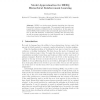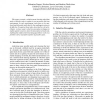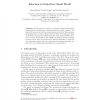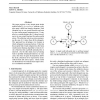ECML
2004
Springer
13 years 9 months ago
2004
Springer
HEXQ is a reinforcement learning algorithm that discovers hierarchical structure automatically. The generated task hierarchy repthe problem at different levels of abstraction. In ...
ATAL
2004
Springer
13 years 9 months ago
2004
Springer
This paper presents a reinforcement learning algorithm used to allocate tasks to agents in an uncertain real-time environment. In such environment, tasks have to be analyzed and a...
CEEMAS
2005
Springer
13 years 10 months ago
2005
Springer
Abstract. In this paper we compare our selection based learning algorithm with the reinforcement learning algorithm in Web crawlers. The task of the crawlers is to find new inform...
SAC
2005
ACM
13 years 10 months ago
2005
ACM
This paper presents a novel model of reinforcement learning agents. A feature of our learning agent model is to integrate analytic hierarchy process (AHP) into a standard reinforc...
ICRA
2005
IEEE
13 years 10 months ago
2005
IEEE
— This paper presents a new reinforcement learning algorithm for accelerating acquisition of new skills by real mobile robots, without requiring simulation. It speeds up Q-learni...
ROBOCUP
2007
Springer
13 years 10 months ago
2007
Springer
This paper describes the design and implementation of robotic agents for the RoboCup Simulation 2D category that learns using a recently proposed Heuristic Reinforcement Learning a...
ICML
2003
IEEE
14 years 5 months ago
2003
IEEE
The paper explores a very simple agent design method called Q-decomposition, wherein a complex agent is built from simpler subagents. Each subagent has its own reward function and...
ICML
2005
IEEE
14 years 5 months ago
2005
IEEE
Learning algorithms often obtain relatively low average payoffs in repeated general-sum games between other learning agents due to a focus on myopic best-response and one-shot Nas...




